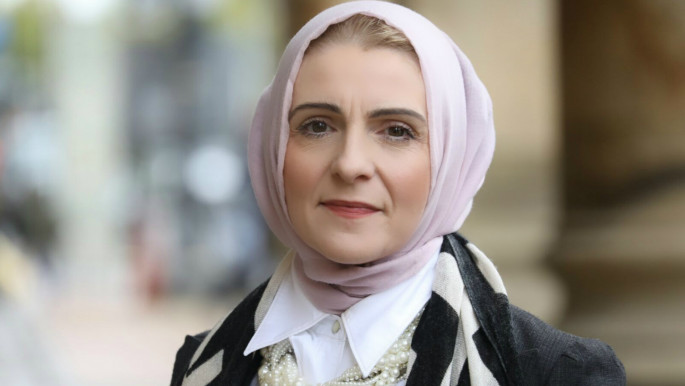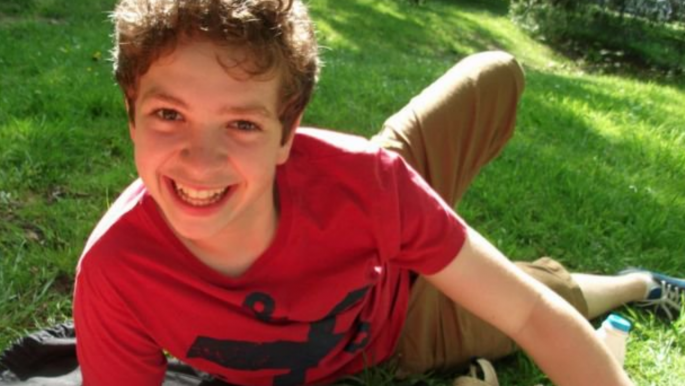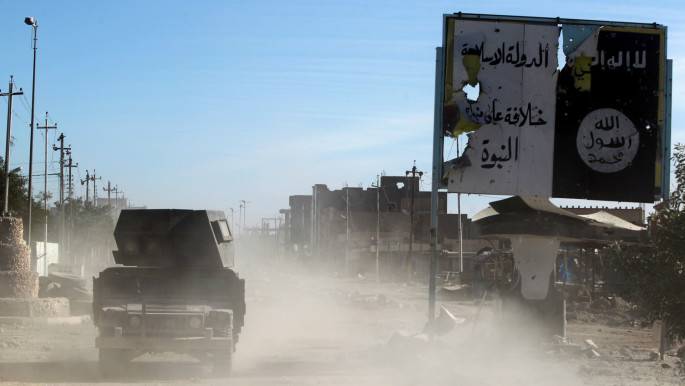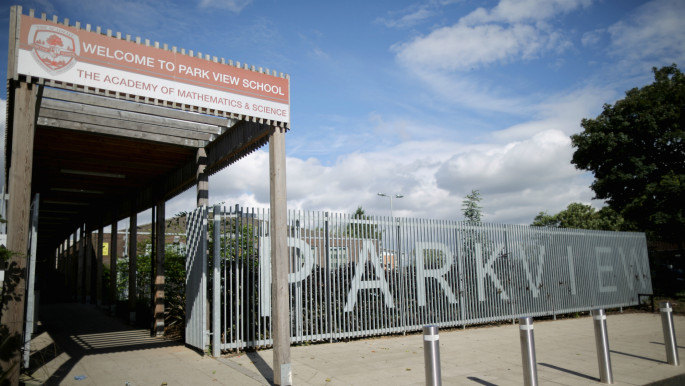Battling extremism: A mother's lament for a radicalised son
"Until the end I was desperate to get my son back," says Benyahia - a counsellor and mother of five - with a slight sigh.
"Before he died, he contacted me on WhatsApp to say that he had been 'summoned'. I knew this meant that he was going to be sent to fight.
"Everyone grieves differently, but because of the shame it was incredibly difficult."
Rasheed Benyahia was one of around 850 people that have travelled from the UK to join the Islamic State group and other jihadist organisations since Syria's civil conflict broke out in 2011.
He was killed on November 20, 2015.
An airstrike targeting Islamic State group militants on the rocky slopes of Mount Sinjar in northern Iraq ended his life, along with several others.
Benyahia went public about her son's radicalisation a year later.
She set up Families for Life, an anti-radicalisation charity aimed at tackling extremism through early intervention, re-integration programmes, and providing counselling and support to people that have been through similar experiences to her.
Benyahia is motivated by her struggle to find support for her family after Rasheed's sudden disappearance from the family home. She says she wants to be a role-model to her daughters.
"From day one, the police were involved - because we alerted them. I was still trying to go to work, none of my colleagues knew the situation… the police were obviously suspicious. I told them we needed support. I felt like I was going crazy.
"I would have gone public sooner but I had to respect my family, and wait for the right time… I felt that I had no voice, that I was gagging myself. I thought 'if I stay silent what sort of example am I setting? We will just be another statistic, and it will carry on'."
 |
| Benyahia went public about her son's radicalisation in November 2016 and has since set up Families for Life [Supplied] |
Familes for Life has been set up with the backing of the German Institute on Radicalization and Deradicalization.
Its founder, Daniel Koehler - who has worked with US government agencies on deradicalisation strategies - provided an unexpected source of support to Benyahia following Rasheed's radicalisation, at a time when British counter-terror officials became daily visitors to the family home seeking only evidence to aid their investigations, and not to provide comfort to a grieving mother.
Benyahia contacted Koehler after becoming aware of his work during frantic Googling at a time when Rasheed's precise whereabouts were still unknown.
"There must have been as many as twelve officers in and out of our house, but they wore plain jackets so that people did not know who they were and took stuff out for forensics in bin bags rather than clear bags so as not to raise attention. Some of the investigators were very respectful," says Benyahia.
"I wrote [Koehler] an email, and it must have sat inside my draft box for several days. Rasheed had probably been missing around six or seven weeks. The investigation had been going on the same period of time," says Benyahia.
"When I spoke with him I felt he understood what I was going through."
 |
| Rasheed Benyahia was working as an electrical engineering apprentice before travelling to Syria [Twitter] |
Rasheed's disappearance in May 2015 came as a complete shock, says Benyahia.
But as the weeks passed, and counter-terror officials got to work, a picture of his journey from suburban Birmingham to the battlefields of the Levant began to emerge.
Meanwhile, intermittent contact with Rasheed via WhatsApp and Skype - which Benyahia relayed to counter-terror officials - revealed a son quickly slipping away.
On an ordinary weekday morning, Rasheed Benyahia left the family home ostensibly on his way to work. He was an electrical engineering apprentice.
But he never arrived. Instead, he took a bus to Birmingham's international airport, and boarded a flight to Turkey. He then travelled overland to the Syrian border and joined up with Islamic State group recruiters.
He went on to travel to the extremist group's de facto capital in the city of Raqqa on the banks of the Euphrates - where he remained for several months, and told his mother of being matched in marriage with a potential Algerian bride - before he was called to the Sinjar front.
Massacres carried out by IS militants against local Yazidi communities in Sinjar at that time have been described as "genocidal" in their brutality.
But Rasheed's radicalisation and journey to the battlefields of the Levant was not achieved on his own.
Investigations have revealed that he may have planned to travel with others from Birmingham and other areas of the UK.
Birmingham - a city of more than one million, where around 20 percent of the population identify as Muslim - has been identified as a hotspot for recruitment in the UK.
Since Rasheed's disappearance, other individuals from the city have been arrested by British counter-terror officials. They were planning to travel, or facilitate travel for others to join the Islamic State group, according to police sources.
Anis Abdalla, a 27-year-old IT technician was found guilty of trying to join IS after the Birmingham resident was found along with two other suspects hiding in a vehicle at the port of Dover in April 2016.
Another Birmingham man, computing expert Junaid Hussain, was killed in a targeted drone strike in Syria having fled the UK while on bail. He joined the Islamic State group after crossing into Aleppo province from Turkey via the border town of Jarablus in August 2015.
 |
| Around 850 people have travelled from the UK to join the Islamic State group and other jihadist organisations in Syria and Iraq since Syria's civil conflict broke out in 2011. [AFP] |
"Because of the circumstances I don't really feel I have been able to mourn," reflects Benyahia.
Since Rasheed's death a number of potential triggers have weighed on her mind.
What could have contributed to his transition from an attentive son, with a decent record at school and a passion for free-running into an IS recruit?
"With retrospect you pick at signs" says Benyahia.
In 2014, Benyahia was a board member at the Park View Educational Trust implicated in the Trojan Horse scandal - in which British counter-terrorism officials deemed there was "disturbing" evidence of attempts to spread conservative brands of Islam in a number of Birmingham schools, leaving children vulnerable to radicalisation.
Legal proceedings related to the scandal remain ongoing, while Ofsted officials last year warned that the situation in some Birmingham schools "remains fragile", with children at "risk of falling under the influence of extremist views".
Some of those implicated in the scandal have called the British government's handling of the affair a "witch-hunt", its conclusions based on "unreliable and weak evidence" tarnished by "religious and racial prejudice".
"Looking back, in the last year I was a governor I felt there was a shift, I have scrutinised and scrutinised, the investigations are still ongoing. They [Ofsted] still can't get to the bottom of it," says Benyahia, a furrow forming on her brow.
 |
I would have gone public sooner but I had to respect my family, and wait for the right time. I felt that I had no voice, that I was gagging myself. I thought 'if I stay silent what sort of example am I setting?' |  |
"Me and my husband were having difficulties and had separated," says Benyahia.
"Then when Trojan Horse broke out, Rasheed was very aware of the stress I was under. I think someone could have used it as fuel, like 'Oh look what they are doing to your mum after she has dedicated 12 years to these schools'."
In 2014, the Islamic State group emerged following a schism in al-Qaeda's Iraqi franchise. It capitalised on power vacuums created by Syria's civil war to take control of vast swathes of territory totalling some 210,000 square km - roughly the size of the UK - straddling Syria and Iraq in a series of lightning advances.
Most observed IS' brutal rise with horror and revulsion. Others felt its allure.
Thousands flocked to IS from overseas, finding an appeal in the extremist group's disturbing videogame-esque projections of a violently exclusive Utopian "Islamic" community and enticed by promises of worldly and other-worldly bounties for honours earned on the battlefield.
"Rasheed wasn't feisty, or even that moody, he was quite soft-natured," says Benyahia. "Whoever radicalised my son, nobody wants them brought to justice more than me."
Benyahia wears a hijab, attends the mosque, and says that Islam provided a sense of calm, and purpose to her upon converting at the age of 19.
 |
| Benyahia resigned from her position on the Park View Educational Trust board in the aftermath of the Trojan Horse scandal [Getty] |
She describes her family household as fairly liberal in outlook, and reflects that in 2014 Rasheed stopped attending the mosque with other family members, increasingly praying separately from the family, adopted certain seemingly orthodox sensibilities - such as wearing trousers cut above the ankle - and became increasingly animated about the bloodshed in Syria.
At that time such developments did not evoke huge concern, and seemed like natural behaviour for a teenager growing up, shaping his identity and becoming more independent.
"Apart from four years in Yemen when Rasheed was just a child my children have been raised their whole lives in the UK," says Benyahia. Between 1998 and 2002 she lived in Taiz, where her husband worked as a teacher.
"I think it is part of my children's identity, maybe Rasheed romanticised it, and yearned for it. To get away from the rat-race, maybe thinking that it was going to be the same again."
In some ways establishing Families for Life has served cathartic purposes, says Beyahia, as an outlet for her grief.
However, she concedes that coming to terms with her son's radicalisation is an ongoing process, and she continues to have many unanswered questions. She also accepts that not everyone will support her endeavour.
"Some people have trolled me online. People have their own opinions and I have had some nasty messages. Those are inevitable, no matter what."
 |
Before he died, he contacted me on WhatsApp to say that he had been 'summoned'. I knew this meant that he was going to be sent to fight. Everyone grieves differently, but because of the shame it was incredibly difficult |  |
Since going public Benyahia says she has been contacted by staff from the British government's Prevent anti-extremism task force over the possibility of conducting workshops.
"One of the inspectors who worked on Rasheed's case got in touch to say that I had ruffled a few feathers… Before I went public [they] hinted at doing workshops with them and over Christmas I was contacted by Prevent in Westminster and went down to do a talk with kids on the verge of radicalisation in gangs."
She says she has reservations, given the reputation the often-maligned initiative has garnered in the British Muslim community.
| Read more: UK lawmaker slams 'Prevent' intelligence-gathering on Muslim children |
"I don't mind working alongside [Prevent] but I also need to work separately so I can build trust… unfortunately Prevent has quite a toxic reputation in the community."
Benyahia is looking forward to the challenges that lie ahead.
Nevertheless, she reflects that her work with Families for Life will always remains connected with the pain and trauma of losing her only son.
"I still feel now there is no real closure.
"No matter what culture, or what religion, when someone dies there is a process of saying goodbye. I was robbed of this, robbed of my son, and of his body as well," says Benyahia.
"The British government officially does not recognise Rasheed's death because there is no body… I think it is seven years - and only then I can apply for a presumed death certificate. Every month I still receive bank statements, reminders of his appointments from the asthma clinic, things from college saying 'Congratulations, you have graduated. What is the next step?'
"These are constant reminders and I can't stop them."
Follow Martin Armstrong on Twitter: @MKLArmstrong





 Follow the Middle East's top stories in English at The New Arab on Google News
Follow the Middle East's top stories in English at The New Arab on Google News


